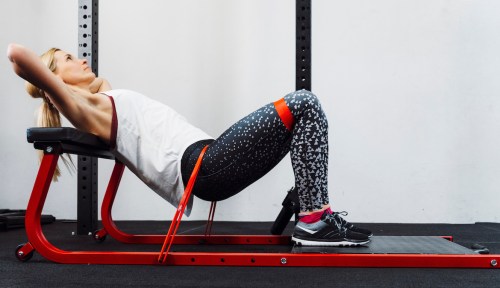Before fitness trackers were ever a thing, people would—gasp—only have their own bodies to listen to when it came to how they felt. But now, thanks to the super impressive technological advancements in wearables, our body’s health data is front and center, 24/7.
This is a relatively modern way of living—though I (and you) have lived for decades without knowing what our heart rate variability is at any given moment or how many cycles of REM sleep that we clocked the night before, it’s interesting to be bombarded with detailed insights at a flick of the wrist. These days, trackers are telling us things like whether we should train hard or recover, go to bed earlier, or skip that early morning workout in order to sleep instead.
With the growing amount of advice coming out of these trackers, it can start to feel like your wearable holds more weight in your workout or recovery decisions than your own common sense (and how you feel). Just how can you keep a balanced relationship with your wearable? We asked experts for some insight.
How trackers are influencing our behavior
In the case of Whoop, for example, you’re given numbers that tell you just how hard you can push yourself (physically) based on the numbers that your body’s recovery (which takes into account your sleep quality and heart rate variability). “Monitoring sleep is fundamental—we’ve learned that it’s just as important as exercise, and the more REM and slow wave sleep an individual got, the better they performed in sports,” says Will Ahmed, Whoop founder and CEO. In my experience using Whoop, my recovery “score” is usually spot on—it’s typically high (in the green level) post-eight hours of sleep, which inspires me to go hard at the gym (and vice versa) because I know my body is primed to take on physical stress.
Used like that, having access to personalized advice about your body is certainly helpful. But it can also reach a point where your tracker fully guides your fitness decisions—like making you feel as though you must get a high step count every single day—so there’s a fine line between using it to guide your training and pushing yourself too hard because you want your activity numbers to be high. On the flip side, you can start to feel guilty when you ignore everything that your tracker is telling you. You know, like when you’ve logged a few consecutive days of poor sleep yet you still stay up late binge-watching your favorite show (and feel horrible the next day).
“Having all of that data is a catch-22—the idea is great, but knowing it isn’t going to necessarily initiate a behavior change,” says Hillary Cauthen, PsyD, CMPC, certified mental performance consultant with the Association of Applied Sport Psychology. “Look at how you think about [your tracker] and what your attitude around it is. It’s tricky because you can get major positive feedback, which can egg you on to do more. But you might fall into being overdependent, and shift from a healthy application to this over-attendance and obsessive thoughts on having to do more and to keep maintaining, and people can get fixated on that, which is a problem.”
“Having all of that data is a catch-22—the idea is great, but knowing it isn’t going to necessarily initiate a behavior change.” —Hillary Cauthen, PsyD, CMPC
The other end of the spectrum is if you’re not taking your wearable’s data into account at all, with knowledge that could impact your health. “If your tracker is continually telling you that you’re not getting enough sleep, you should listen,” says Dr. Cauthen. She says to think about it like driving a car with a “check engine” light on. “If you ignore it for too long, it damages your car. If you don’t pay attention to these warning signs, eventually something will break down, whether it’s an injury or not improving your strength.” Her tip? Think of the data—when it’s telling you that you’re run-down or not fully recovered, for instance—as a sign to check in and give yourself what you need.
Having a healthy relationship with your tracker
The key to having a healthy relationship with your tracker, then? Use it as your guide, but not your boss. “Sometimes we’re so fixated on our tracker that we forget to listen to our body, which is our most important advice-giver,” says Dr. Cauthen. It can be harder than it sounds, but she suggests to connect with your tracker when you really need it—like when you’re judging whether you could use more of a push in a workout, or if your heart rate variability suggests a rest day—and rely on your body first and foremost. “You do know that you worked and moved your body. If you didn’t track your sleep, you know when you went to bed or woke up,” she says. “It’s freeing to just be in the process of moving and enjoy the moment rather than constantly track and check your stats.”
“Health and fitness goals are rarely achieved if you don’t address them holistically,” says Devin VanderMaas, vice president of marketing for iTouch Wearables. As in: Pay attention to sleep, your diet, exercise, mental wellbeing, etc, and not just how many steps you take in a day when figuring out how hard you train or recover. “Smartwatches and fitness trackers are great tools, but if the user is still not sleeping enough or enduring too much stress, then receiving key metrics really doesn’t matter.”
When you’re looking to get a tracker, Dr. Cauthen recommends thinking about what data you’re looking to get. “What are you going to use the information for?” she says. “For example, I monitor my running, and I look at data to see if there are patterns that help to explain why I have an off-week.” VanderMaas adds that you should also clearly define your goals and how your tracker can assist you with achieving them. “We find that if users limit the metrics that they’re focusing on, they actually pay attention to the ones that matter the most and are able to make behavioral changes necessary to meet their goals since they’re not overwhelmed by too much information,” she says.
Just make sure your smart device is a tool. “Smart devices are not the end goal, they are a means to a goal,” says VanderMaas. “It’s important to not lose sight of the purpose for purchasing a tracker, which, at the end of the day, is an accountability tool and should be used as such. It is data, a reminder, a guide, but it isn’t the core psychological motivation that will make the user take action.” Don’t forget that your body is the smartest guide that you have.
Sign Up for Our Daily Newsletter
Get all the latest in wellness, trends, food, fitness, beauty, and more delivered right to your inbox.
Got it, you've been added to our email list.










